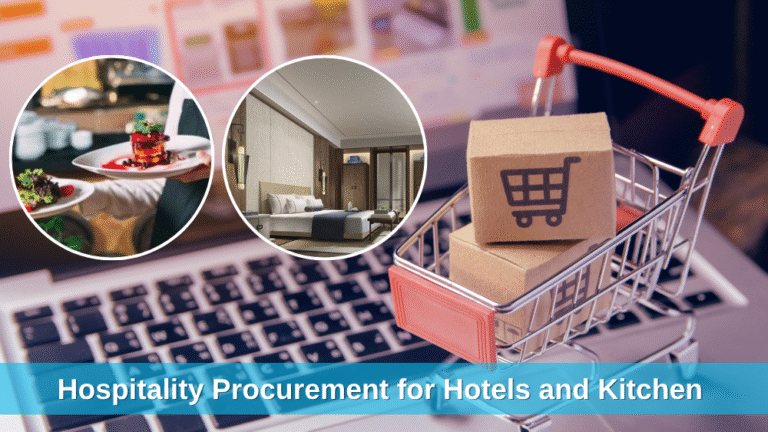Running a hotel, resort, or restaurant is not just about offering excellent service—it also involves smart planning, efficient purchasing, and top-quality equipment. This is where hospitality procurement plays a major role. Whether you manage a small boutique hotel or a 5-star luxury property, understanding procurement can save costs, improve service quality, and boost customer satisfaction.
In this blog, we’ll explore everything you need to know about hospitality procurement, with a focus on luxury hotel procurement and kitchen equipment procurement. We’ll explain the process, benefits, and best practices to help your hospitality business succeed.
What is Hospitality Procurement?
Hospitality procurement is the process of sourcing and purchasing goods and services needed to run a hotel, restaurant, or resort. This includes everything from furniture, fixtures, and operating supplies to food, beverages, linens, and cleaning products.
Procurement ensures that you get the right product, at the right time, at the best price, from the right supplier. It’s about managing vendors, comparing prices, ensuring quality, and keeping inventory well-stocked.
Why Is Hospitality Procurement Important?
Here are some key reasons why hospitality procurement matters:
- Cost Control: Smart purchasing helps reduce operational costs.
- Quality Assurance: Reliable suppliers provide high-quality products that enhance guest experience.
- Efficiency: A streamlined procurement process saves time and avoids last-minute shortages.
- Sustainability: Choosing eco-friendly suppliers helps meet green hotel standards.
- Brand Consistency: Especially in chain hotels, procurement ensures uniform standards across all locations.
Luxury Hotel Procurement: Meeting High Standards
Luxury hotel procurement is a more advanced and detailed process. Luxury hotels offer premium services, which means every product—be it a bathrobe, a coffee machine, or a designer chair—must meet high standards.
What Do Luxury Hotels Procure?
- High-end furniture & décor: Custom-made sofas, beds, curtains, carpets, and artworks.
- Room amenities: Luxury toiletries, branded towels, bathrobes, and linens.
- Technology: Smart TVs, keyless entry systems, high-speed Wi-Fi routers.
- Spa and wellness equipment: Massage tables, sauna units, and premium skincare products.
- Restaurant and bar supplies: Fine china, crystal glassware, and premium kitchen appliances.
Key Points in Luxury Hotel Procurement
- Attention to Detail: Every product must align with the hotel’s brand and theme.
- Vendor Selection: Only trusted suppliers with a proven track record are chosen.
- Customization: Luxury hotels often request custom-made items for exclusivity.
- Timely Delivery: Delays can affect hotel operations or renovation timelines.
- Sustainability & Ethics: Many premium hotels now prioritize eco-friendly products and fair-trade suppliers.
Kitchen Equipment Procurement: The Heart of Hotel Operations
The hotel kitchen is where the magic happens. Be it breakfast buffets, à la carte dining, or in-room service, everything depends on top-quality kitchen equipment. That’s why kitchen equipment procurement is a key part of hospitality operations.
Types of Kitchen Equipment Procured
- Cooking Equipment: Commercial ovens, stoves, griddles, and deep fryers.
- Refrigeration Units: Freezers, walk-in coolers, and display fridges.
- Food Prep Tools: Mixers, slicers, food processors, and cutting boards.
- Dishwashing Units: Industrial dishwashers and sinks.
- Storage Solutions: Stainless steel shelves, racks, and food-grade containers.
- Smallwares: Pots, pans, knives, utensils, and serving trays.
Factors to Consider in Kitchen Equipment Procurement
- Durability: Equipment should withstand heavy, daily use.
- Energy Efficiency: Lower utility costs and eco-friendly operations.
- Brand Reputation: Trusted brands ensure performance and longevity.
- Service & Maintenance: Easy access to spare parts and after-sales support.
- Compliance: Equipment must meet safety and hygiene standards.
Steps in the Hospitality Procurement Process
Here’s a simplified overview of how procurement works in the hospitality industry:
Need Identification
The procurement team or hotel management identifies what items are needed—for example, new bedding, restaurant chairs, or a kitchen oven.
Budgeting
They set a budget based on current expenses, forecasts, and vendor quotes.
Vendor Search
They search for suppliers who offer quality products within the budget.
Request for Quotation (RFQ)
The hotel sends out an RFQ to multiple vendors asking for prices, specifications, and delivery timelines.
Evaluation and Negotiation
The procurement team evaluates all quotes, negotiates terms, and selects the best offer.
Purchase Order (PO)
A formal purchase order is issued to the selected vendor.
Delivery and Inspection
Once delivered, the products are inspected for quality, quantity, and condition.
Payment and Record-Keeping
Payment is made as per agreed terms, and procurement records are updated for tracking and auditing.
Best Practices for Hospitality Procurement
Here are some practical tips to improve your procurement process:
- Work with Trusted Suppliers: Build long-term relationships for better service and pricing.
- Use Procurement Software: Automate processes to save time and reduce errors.
- Plan Ahead: Forecast demand to avoid last-minute purchases.
- Negotiate Smartly: Always compare quotes and ask for bulk discounts.
- Prioritize Sustainability: Go green where possible, from recyclable packaging to energy-efficient appliances.
- Train Staff: Educate your procurement team on the latest industry trends and tools.
Challenges in Hospitality Procurement
While procurement brings many benefits, it also comes with challenges:
- Price Fluctuations: Market prices for products like food and steel can vary.
- Supply Chain Delays: Delivery issues can slow down hotel renovations or opening timelines.
- Quality Issues: Sometimes products don’t match the promised specs.
- Lack of Inventory Control: Overstocking or understocking creates waste or shortage.
To overcome these, proper planning, reliable partners, and a flexible approach are essential.
Final Thoughts
Hospitality procurement is more than just buying things—it’s a strategic process that affects your hotel’s cost, quality, and guest satisfaction. Whether you’re handling luxury hotel procurement or focused on kitchen equipment procurement, making the right choices can significantly impact your success.
By understanding the procurement process, working with the right suppliers, and using smart tools like Atqan Pro, you can ensure smooth operations, happy guests, and long-term growth. Atqan Pro simplifies the hospitality procurement process by offering reliable sourcing, vendor management, and cost-effective solutions tailored to your hotel or restaurant’s needs.
